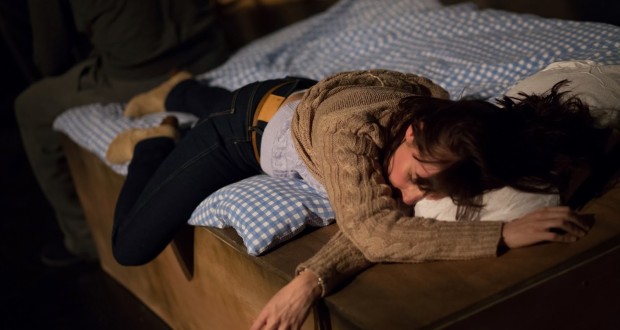Pros: The storytelling in the first half is clever; like a good woman it doesn’t reveal everything at once.
Cons: The latter half of the play was slow, and long monologue-style conversations had me exhaling to display my lack of interest. An original plotline, but not a gripping piece of drama. Missing a certain ‘je ne sais quoi’.
Summary
Rating
Good
The New Diorama Theatre sits neatly in the very modern Regents Place near Euston Station. It’s a multi-functional space occupied by residents, workers, shops, restaurants, and the occasional bit of installation art. A great central location, it’s a nice place to visit because it still feels relatively new and clean compared to places that are less new and less clean. In short I liked the venue, however the foyer is small and it felt slightly crowded at the interval. Fortunately I visited the New Diorama to watch a play and not to do cartwheels and star jumps. I save that sort of thing for the Old Vic.
In the first half of In Doggerland the story unfolded well: revealing bit-by-bit incomplete and suggestive details, the playwright successfully left his audience intrigued and wanting to know more. It was thoroughly mysterious for a good twenty minutes or so, and the initial uncertainty of the relationship between the men and women was also refreshingly unpredictable. I tried to read as little as possible about the play beforehand – it’s more fun that way.
The literal details of the plot were original; it was a story I hadn’t seen told before and this originality was engaging. The writing deserves credit for the fact that it gently pieced together the history of the characters through their shared present moments and living memories. I think there’s something quite elegant about writing that doesn’t provide explanative or supporting details in an easy and obvious way. In real life we don’t begin every conversation with a convenient summary of our life history; it reveals itself gradually and subtly, and the playwright achieved this graceful disclosure through his dialogue, which included lots of retrospective observations and recantations of memory.
Thematically, memory played a large part in the play, and was quite deliberately connected to the unrealised landscape of the coastal scene; the sea. The motif of the sea, and more specifically coastal erosion, was used to represent death (in my mind anyway); however the associations were dimmed by the fact that the stage design was almost a blank canvas. The simple wall structure was, I concede, effective in the way that it allowed the play to move swiftly from location to location with ease. Nevertheless, the lack of any visual backdrop in those scenes located by and directly referencing the sea dampened the potential dramatic effect of the motif in play. A projector screen or large photograph could have sufficed. Without strong supporting mechanisms such as music, stage design and lighting design the drama becomes heavily reliant upon the actors, because there isn’t much else to look at.
In the first half I enjoyed learning about the characters and the events which had transpired to bring them all together. In the second half, without the stimulation of unnamed traumatic mysteries from their past, the characters became less engaging, and at times dull. The dialogue had shifted from being conversational and quick, to slower and sentimental in a way that felt clichéd rather than heartfelt. During some longer pieces of semi-monologue I drifted off. I think the intention was to move, but this motivation had skewed and overridden the characterisation. Their speeches held no weight with me because I never liked, disliked or empathized with them.
All in all In Doggerland wasn’t a bad play. The first half was well written and Natalie Grady stood out as a convincing and compelling performer who also made me laugh. Unfortunately the second half let the drama down, and I really lost interest in both the characters and their journeys. It’s hard to explain why, but something was definitely missing. I’d be interested to hear other people’s thoughts.
Author: Tom Morton-Smith
Director: Hannah Tyrrell-Pinder
Booking Link: http://www.boxoftrickstheatre.co.uk/indoggerlandtour.html
Booking Until: 30th November 2013
 Everything Theatre Reviews, interviews and news for theatre lovers, London and beyond
Everything Theatre Reviews, interviews and news for theatre lovers, London and beyond



